Why the British are obsessed with the Cotswolds

8 hours ago
By Clare Thorp,
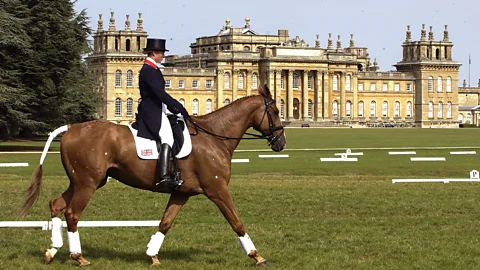 Getty Images
Getty ImagesThe countryside idyll in Oxfordshire is having a moment, and as the super-rich descend upon it, books and TV dramas are depicting the wealthy set of this rural enclave.
The British writer Plum Sykes knows a thing or two about intense social groups. The ex-Vogue staffer and New York It girl-turned author has spent much of her career immersed in and observing them. In her previous novels, Bergdorf Blondes and Debutante Divorcee, she’s used her insider knowledge to skewer the world of Manhattan’s Upper East Side. Now back in the UK, she needed another glamorous, gossipy, cut-throat world to write about – and she found it on her doorstep in the English countryside.
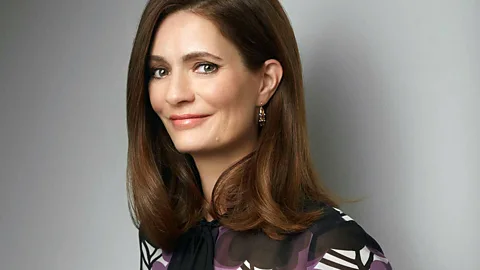
Sykes’s new book Wives Like Us is a satirical comedy of manners about a group of super-rich women living in the Cotswolds, an area that’s having a bit of a moment in pop culture. The US novelist Armistead Maupin has set the latest instalment of his landmark Tales of the City series, Mona of the Manor, not in San Francisco, but in a country pile in the Cotswolds. Taylor Swift is reportedly relaxing in a £3.3m cottage in the area in-between dates on her Eras tour. And later this year, a glossy adaptation of Jilly Cooper‘s best-selling bonkbuster Rivals – set in the fictional Cotswold country of Rutshire – will hit our screens.
A designated area of natural beauty covering nearly 800 sqare miles in the south of England, visitors have long swarmed to the Cotswolds to take in its rolling hills, picturesque villages and famous honey-coloured limestone buildings (it attracts around 25 million visitors a year – compared with a population of around 150,000). Its quintessential rural charm and proximity to London – most of its more famous spots can be reached in less than a couple of hours from the capital – also makes it a popular spot for the well-heeled to decamp for the weekend. A-listers including Kate Moss, Elizabeth Hurley and Kate Winslet have homes there.
But recently, things have gone up a gear. The Cotswolds have gone from bucolic fantasy to billionaire’s playground, pulling in an increasingly glitzy crowd.
 Disney+
Disney+“I’ve been living out here on and off for the last 15 years, and I’ve really seen a change,” Sykes tells the BBC. “I started to sense a few years ago that a bit of the Cotswolds had become really glamorous and over the top, and was actually getting a bit out of control… women going on a hack (a horse ride) dressed up as if they’re going to a ball, helicopters landing at sports day. When the spending and the lifestyle starts to get out of control, that’s when it’s ready for satire. “
Sykes grew up in rural Kent, but it wasn’t until her 20s, when working as an assistant to Isabella Blow at Vogue, that she first discovered the Cotswolds. “Her husband had a really beautiful estate in Gloucestershire. I used to go for the weekend, and I really fell in love with it.” She moved to New York in the late 1990s to work for Anna Wintour at Vogue, and she and her twin sister Lucy ruled the social scene there for a time. When Plum came back to the UK to raise her family she knew she wanted a place in country – specifically, the Cotswolds. “We eventually bought a farm which was derelict and did it up, and just kind of slowly migrated from London.”
Where she lives in rural Gloucestershire is removed from the world of her book. “It’s very remote, it’s not social, there aren’t any parties.” Instead, the part of the Cotswolds that inspired her fictional villages of Little Bottom, Middle Bottom, Great Bottom and Monkton Bottom is across the border in Oxfordshire – specifically the market town of Chipping Norton and its surrounding villages. “That’s the fun part to write about because it’s the most socially intense.”
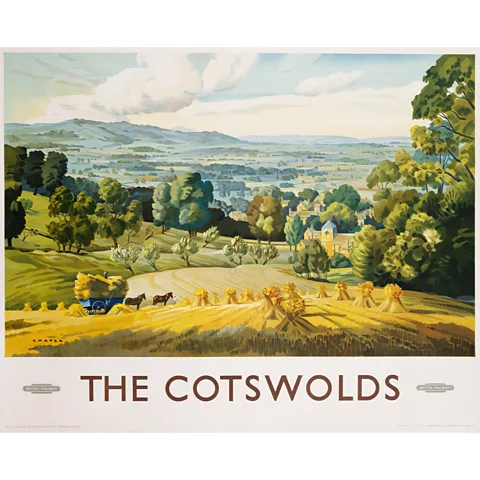 Getty Image
Getty ImageIn 2011 the British media christened a group of political and media power players that lived and socialised in the area the “Chipping Norton Set” – these included then Prime Minister David Cameron and his wife Samantha, newspaper executive Rebekah Brooks, Elisabeth Murdoch (daughter of Rupert) and Jeremy Clarkson.
In 2015, things got starrier when Soho Farmhouse, the rural outpost of the exclusive members’ club, opened up down the road. The arrival of the country-club-come-luxury holiday camp was a turning point, says Sykes. “It just brought a whole load of people to the Cotswolds who were monied and who were not country people. It brought celebrities.” That included stars like Brad Pitt, Harry Styles, Margot Robbie and Meghan Markle – who had her hen party there.
A year after it opened, David and Victoria Beckham bought a Grade II listed farmhouse nearby, and demand for properties in the area soared. The pandemic intensified the rush to the country. “All those people who previously had just done weekends came out and lived there,” says Sykes. “And they refashioned the Cotswolds to suit themselves, with all the pleasures and all the social intensity of London.”
Indeed, a spate of new luxury openings means Soho Farmhouse feels slightly old news now. Estelle Manor, a country outpost of a Mayfair private members’ club, has become the new hotspot for up-from-Londoners. There’s also The Bull at Burford, a hotel-come-pub-come-sushi restaurant from PR guru Matthew Freud; and new opening from The Pig, a British chain of upmarket boutique hotels. Daylesford – the upmarket organic farm shop that opened in 2002 and has since grown into a Cotswold empire – launched an exclusive member’s-only wellness club last year.
Country living
The Cotswolds may suddenly feel like the place to be, but in fact, it has been a magnet for fashionable and cultural figures for nearly 200 years. The area became wealthy in the Middle Ages thanks to the woollen and weaving industries, and many of its grandest buildings can be traced back to that time. But when those industries declined, it fell into poverty. “It became a complete backwater,” says Jane Bingham, author of The Cotswolds: A Cultural History. “There was basically no building and no development for 200 years. It was poverty and industrial decline that made it the beautiful sort of wilderness that it was, until the 19th Century when it got rediscovered.”
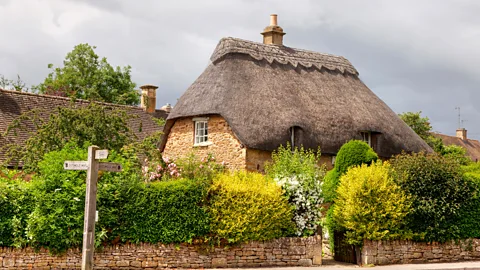 Alamy
AlamyOne of those to rediscover its beauty was William Morris who rented a house, Kelmscott Manor, where he lived somewhat unconventionally with his wife Jane and her lover, Dante Gabriel Rossetti. “William Morris, you could say, was the original country weekender,” says Bingham. “He loved the idea of living in the country but he kept his house in Hammersmith [London].”
Where Morris led, others followed. Charles Robert Ashbee moved his Guild of Handicraft from London’s East End to the Cotswold town of Chipping Campden, establishing an Arts and Crafts community there. Broadway, just over the border in Worcestershire, was home to an artists’ colony in the late 19th Century, including John Singer Sargent, Francis David Millet and Edwin Austin Abbey. The area attracted writers, too – Henry James, JM Barrie and JRR Tolkien, who was inspired by sites like the ancient Rollright Stones. Asthall Manor – the childhood home of the Mitford Sisters – served as inspiration for Nancy Mitford’s fictional Alconleigh in The Pursuit of Love.
Americans, especially, have long taken a shine to the Cotswolds. In the 1920s Henry Ford, founder of the Ford Motor Company, liked it so much he transported an entire stone cottage back to Michigan. More recently, cult US furniture brand Restoration Hardware moved into the grand estate of Aynhoe Park (where Noel Gallagher had a starry 50th birthday party), turning it into a hospitality venue-come-art gallery-come-glorified furniture showroom. There’s also a surge of interest in Cotswold properties from wealthy US buyers. “I’ve had a lot of Americans try and rent my house,” says Sykes. “It’s their dream to come and live in the English countryside for a week. To them it’s the chocolate-box fantasy.”
The Cotswolds is the idealised version of the English countryside that exists in many people’s heads – one full of rambling roses, bubbling brooks, tea shops and antique centres, but without the harsh realities of much rural life. “It doesn’t feel like people are going there to wallow in mud and pick potatoes,” says Sykes. “They’re going there to have a glass of rosé on a stone terrace.”
The late writer AA Gill was scathing of this part of the world for this very reason. In his book The Angry Island, he lamented the “new ruralists” that had taken over the “Valium landscape” of the Cotswolds, and criticised the area’s unnatural neatness, with its “little sign of dirty farming and nature”.
 Getty Images
Getty ImagesIn fact, there are many working farms. There is also lots of deprivation. BBC comedy This Country, written by siblings Daisy May and Charlie Cooper, and inspired by their own lives in The Cotswolds, shows another side to the area: of poverty, boredom and desperation – certainly not one that anyone spending a weekend within the Disney-esque bubble of Soho Farmhouse or the like would experience.
There are also real issues of locals being priced out of the area, and many are fed up with the chaos caused by hordes of tourists. As more people descend on the areas, there are tensions amid the one-percenters, too. “I think the old lot kind of hate the new lot,” says Sykes. “Anyone who’s just arrived is the new lot and anyone who arrived five years ago thinks they’re the old lot.”
“They’re both really beautiful little enclaves of each country, but it’s hilarious to think that anyone could think my village could be like the Hamptons,” she tells the BBC. “It’s a proper working village, and that is what’s dotted all around the Cotswolds. At its heart, it’s a real place with real people. It’s just in a very beautiful part of the world.”
Alice moved to Hook Norton in Oxfordshire with her family 11 years ago, and loves the sense of community and creativity, as well as the beautiful countryside. “We live quite normal lives here, but it’s interspersed with some amazing people and things and experiences.”
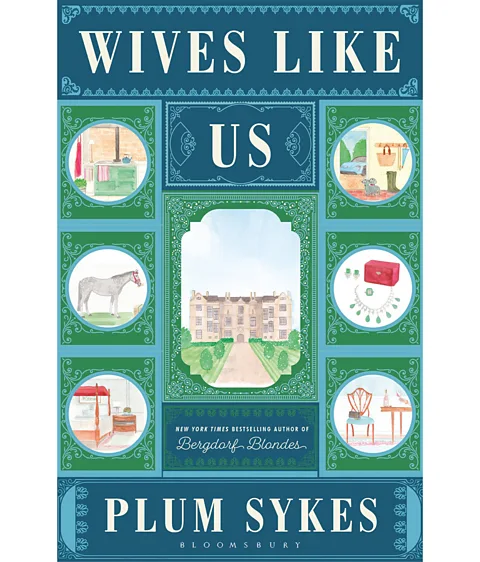 Bloomsbury
BloomsburyAs someone living in the thick of the area her sister’s book is based on, does she recognise its depiction of the Cotswolds? “I mean, if you go to Daylesford it is definitely full of the types of people in Plum’s book. There’s a load of women with straight blonde hair, designer handbags and big cars.”
Since Wives Like Us was published, locals have been furiously trying to work out who provided inspiration for the fictional characters (some real-life Cotswolds characters get name checks, too). “People are either really worried they’re in it, or they believe that they’re one of the main characters,” says Plum. “But generally they’re enjoying it.”
Living just down the road from Jilly Cooper, she hopes her book offers the same sense of delicious escapism as her much-loved neighbour. “There’s a real appetite for it right now, I think,” she says. For those of us who can’t quite stretch to our own real-life Cotswolds bolthole, the fantasy will have to suffice.









